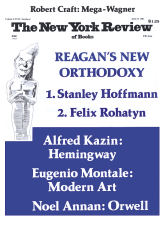In response to:
Chomsky and His Critics from the October 23, 1980 issue
To the Editors:
Professor Hacking has written a perceptive and lucid review of Chomsky’s contribution to cognitive psychology [NYR, October 23]. What is missing is an indication of the vitality of current work and a discussion of new kinds of empirical support for current theories.
A case in point: the possible experiment to which Professor Hacking alludes not only can be done, but has been done. Yukio Otsu of MIT (building on work by Ed Matthei) has shown that four-year-old children know that “each other” in a sentence like the men knew the dogs hated each other must refer to the dogs and not the men, while other experiments indicate that the pronoun them does not have this restriction in the men knew the dogs hated them. This is just what is predicted if reciprocal interpretation involves a linguistic universal.
A small group of us at the University of Massachusetts (with support from NIH, NSF, and the Sloan Foundation) are attempting to see when and how children acquire subtle aspects of grammar that could proceed from innate knowledge but would be difficult to infer from context. In each case they exhibit adult knowledge at a surprisingly early age. In an experiment that I did I found that three-year-old children understood that an abstract notion of noun is “uncontrolled.” That is, the children knew that in a sentence like Can you show the dog jumping it is the dog that jumps while in Can you show the dog the jumping anyone can be jumping.
Acquisition studies even provide evidence where theory makes predictions but intuitions of grammaticality begin to falter. Many adults do not have clear intuitions about “backwards coreference” between sentences like Bill saw ‘im after John ran around and Bill saw ‘im in John’s yard. Lawrence Solan and Helen Goodluck, in different experiments, showed that four-year-old children make just the distinction predicted by linguistic theory: ” ‘im” = John, in the first but not the second sentence. The distinction follows from the abstract, hierarchical nature of sentence structure.
A range of other experiments, too intricate to describe briefly, lend support to both the theory of a specific genetic endowment for language universals and to current theories. Neurolinguistic research promises similar corroboration from studies of aphasics. This kind of diverse empirical support is what one expects from a “robust” biological theory. Much remains to be explained, of course; the exact fashion in which linguistic universals are instantiated should reveal a great deal about how the particular module of linguistic ability interacts with other aspects of cognition. The Piagetians, using a pure theory of interaction not rooted in linguistic theory, have been unable to approach any of the truly subtle aspects of complex syntax.
Making successful connections between linguistic theory and language acquisition data is relatively new. It is possible because linguistic theory has entered a phase where it treats language in microscopic detail, which in turn makes experimental hypotheses more precise.
The biological analogy is apt: the use of microscopes in biology meant that biologists were on the road to successful theories, although fundamental changes in perspective were still necessary before modern theories (like DNA) could be formulated. A similar convergence on certain kinds of data and certain questions exists in linguistic theory today, although important divisions of opinion remain (in, say, lexical grammar, relational grammar, and government-binding theory). Both the convergence on data and the sharp disagreements over soluble problems are signs of great vitality.
Thomas Roeper
Center for Cognitive Science, MIT
Cambridge, Massachusetts
This Issue
April 16, 1981



